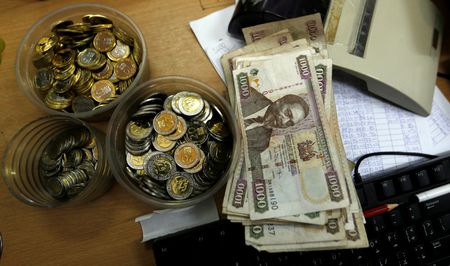By Karin Strohecker
WASHINGTON (Reuters) -Ethiopia expects to reach a preliminary agreement on the third review of its $3.4 billion loan programme with the International Monetary Fund early this week and sees formal debt talks with bondholders starting in summer, State Finance Minister Eyob Tekalign told Reuters.
The East African nation, which struck a four-year, $3.4 billion program IMF deal last July, is in the midst of a far-reaching reform push, including the floatation of its birr currency and a push to get its debt restructuring over the line.
Speaking on the sidelines of the IMF and World Bank Group spring meetings in Washington, Eyob said he had met IMF Managing Director Kristalina Georgieva as well as other staff to discuss progress on reforms.
“They are very much pleased with how the program is going,” said Eyob in an interview on Saturday. “The results we’ve seen now were pleasant surprises, because we’ve over-achieved in many areas, whether it’s in reserve accumulation, in inflationary trends or in export growth.”
Eyob expected the Fund’s executive board to sign off on the review in June – a step needed to trigger the next payout of the loan programme.
Meanwhile talks in Washington with some holders of Ethiopia’s sole $1 billion international bond had also been productive, he said, adding formal talks aimed at hammering out details of a debt rework could start in the summer.
“We cannot get into substantive discussions, because they are waiting to see the latest DSA macro tables from the fund,” he said, referring to the IMF’s debt sustainability analysis.
Ethiopia in March reached a draft agreement with its official creditors on restructuring $8.4 billion of debt, but has been locked in a standoff with its bondholders.
Bondholders and Ethiopia are at odds over whether the country is facing a liquidity issue, meaning it might only need more time to pay, or a solvency issue, which could require more debt writedowns known as haircuts.
A draft deal with official creditors, which is expected to be finalised within months, gives the government more time to pay but stops short of an outright haircut in favour of focusing on payment extensions, lowering the debt service during the IMF programme and cutting interest levels.
Eyob said the country had to follow the principle of comparability of treatment with other creditors.
“Haircut or not, I think this is sometimes an unnecessary debate,” he said. “The whole exercise is to help the country sustainably finance its development – that’s the whole idea behind the debt treatment.”
Ethiopia opted to restructure its external debt under the G20’s Common Framework in 2021, before it defaulted on its sole Eurobond in December 2023.
Eyob also said he was in talks with China’s main trade policy banks – Export-Import Bank of China and the China Development Bank – over concessional financing for projects such as Addis Ababa’s city rail and airport expansions.
He also held meetings with the U.S. International Development Finance Corporation.
“We understand that they see us as one of the priority countries, so we should be able to see more investment from the U.S. side,” he said, adding discussions had focused around direct project financing as well as guarantees across a range of sectors, including energy.
(Reporting by Karin Strohecker;Editing by Dan Burns)








